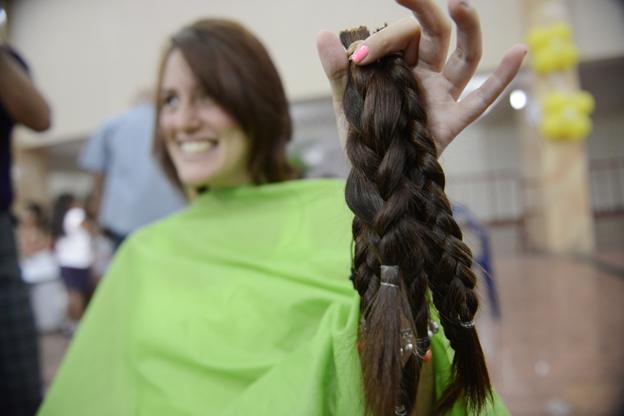A tangled tale of hair robbers
- Published

A Venezuelan woman displays hair which she has cut off for charity
Venezuelan papers are rife with reports that robbers are picking different kinds of locks these days - locks of hair stolen from women to sell in the country's lucrative beauty business. The president says its a rumour designed to make young people paranoid. Even if it is, what does it say about the things Venezuelans value most?
It's the latest trend in Venezuela's crime industry - stealing women's hair. The longer, the better.
It's been happening in Maracaibo, the country's second largest city. For a couple of weeks, newspapers have been dedicating daily headlines to the crime. Victims have said they were approached by a group of two or three. While one person held them down and threatened them, the other would demand that they put their hair up in a ponytail - and then cut it off with gardening shears.
Online publications have been giving tips on how to avoid having one's hair stolen by covering it with a cap or scarf. One website posted a four-minute video tutorial on how to put one's hair up in a bun by using a sock.
I found myself watching it, although my own haircut is so short that thieves wouldn't even approach me.
Hair theft is not a particularly original crime. In South Africa, men have been robbed of their dreadlocks. Cases have also been reported in Burma - and closer to home for me - next door in Colombia and Brazil.
The usual explanation for such theft is that hair is simply sold on to make wigs and extensions. But in Venezuela, many other theories have sprung up to explain the phenomenon. It seems that for commentators, stealing hair is a reflection of the country's many ills. For example, an editorial in the newspaper El Nacional blamed its "beauty culture" for the thefts.
Venezuela does take beauty seriously. It has racked up more Miss Universes and Miss Worlds than anywhere else, and other women feel the pressure on a daily basis. Breast implants are a common present for 15-year-olds. Make-up is a must at all times - even in the gym.

Miss World 2011, Ivian Sarcos, with Venezuelan's late president, Hugo Chavez
Manes of trailing hair extensions are part of this, although I never understood the hype. I used to have long hair myself. When I got tired of it, I cut it off. If I want it long again, I guess I'll just wait until it grows.
But Daniel, my hairdresser, tells me Venezuelan women are impatient with their hair and don't take enough care of it. They dye it, they straighten it, they do whatever it takes for it to look good all the time. That's why extensions are so popular, he says. They are quick and yet they look real.
With these considerations in mind, the newspaper's editorial may even make sense. If women here are willing to go as far as having aesthetic or plastic surgery - which can be dangerous and sometimes even leads to death - then it makes sense that violence infiltrates the realm of beauty. But does the newspaper maybe suggest that women themselves are the ones to blame?
Las Piranas - as the hair thieves are known - are mostly female. But violence is a much deeper issue in this country. According to the UN, Venezuela now has the fifth highest murder rate in the world. Kidnappings are so common that many well-to-do families share a fund with friends, so they always have easy-to-access cash if one of their loved ones is snatched. With such high levels of crime and impunity, it is understandable that thieves try to take advantage of what has become a lucrative market.
Hair extensions don't come cheap. A full head can cost as much as 10,000 bolivares - nearly $1,500 at the official exchange rate. This means a thief can earn up to $500 for a good chunk of hair.
The hair theft phenomenon isn't as simple as it seems. So far, no formal complaints have been filed. The news stories are based on testimonies of a few victims in local media. But here in Venezuela, paranoia is rampant. In Caracas, the capital, there have been no reports of the crime. But people are already worrying. The other night, a woman told me that she wasn't sure whether it was worse for thieves to go for her hair or for her wallet.
And some women are even choosing to cut their hair before someone else snatches it. Daniel, my hairdresser, says my short, basic cut may even become fashionable soon.
You can follow the Magazine on Twitter, external and on Facebook, external
How to listen to From Our Own Correspondent, external:
BBC Radio 4: Saturdays at 11:30 and some Thursdays at 11:00
Listen online or download the podcast.
BBC World Service: Short editions Monday-Friday - see World Service programme schedule.
You can follow the Magazine on Twitter, external and on Facebook, external